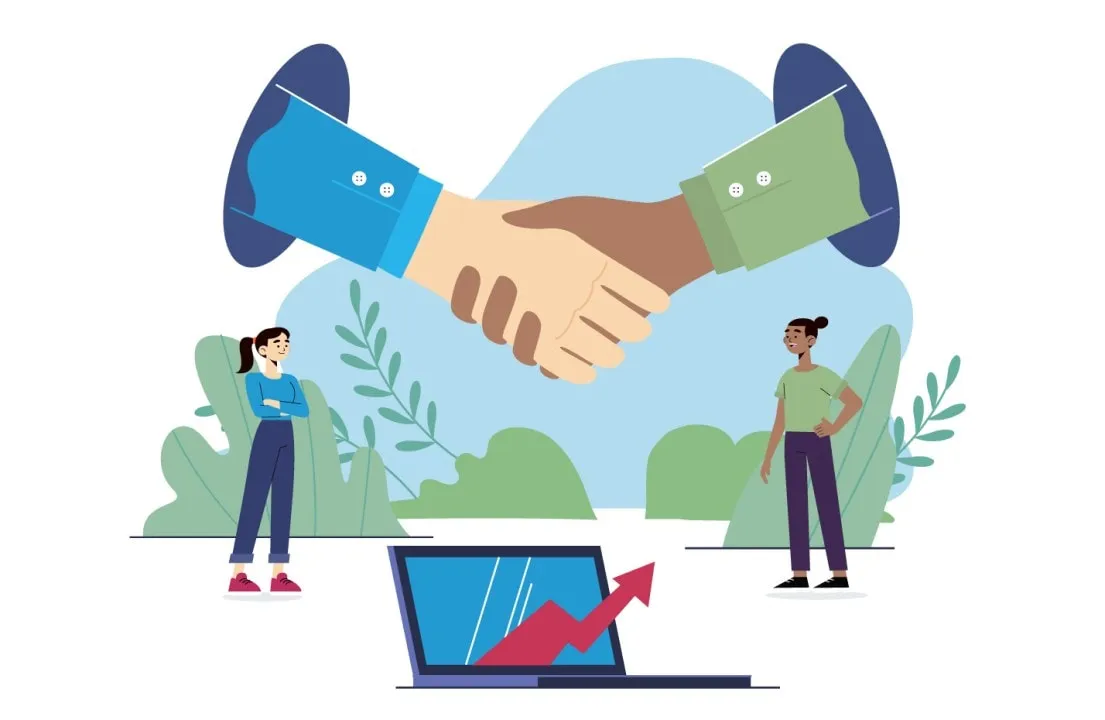Did you know that 83% of successful negotiators use specific power sources to secure better deals?
In this guide, you'll uncover 6 key sources of power in negotiations that could give you the upper hand in your industry or next business deal.
Key Sources of Negotiation Power

1. Bargaining Power
Bargaining power is the ability to make strong deals. It depends on how much you can influence the other party. If you have something they really want, like a rare product or valuable service, you have more power.
Why is it important:
Bargaining power helps you get what you want. It gives you an advantage when negotiating with the other side. Thorough preparation is key to increasing your bargaining power and controlling the negotiation process.
For instance, if you’re the only supplier of a key material, you can ask the company for better terms in the deal.
By failing to prepare, you risk missed opportunities at the negotiation table.
How to use it:
- You can increase your bargaining power by gathering knowledge about the deal. Research the other party and the negotiation process.
- Find out what they need and why. Then, use this information to your advantage. For example, focus on how your offer solves their problem.
- Being well-prepared can make you more powerful at the negotiation table.
2. Walk-Away Power/ BATNA (Best Alternative to a Negotiated Agreement)
Walk-away power means you are willing to leave the deal if you decide it doesn’t make sense or meet your needs. It’s also known as the Best Alternative to a Negotiated Agreement (BATNA). Having a strong alternative deal gives you more confidence.
Why is it important:
Walk-away power keeps you in control. When you have a solid backup plan, you don’t have to accept a bad deal.
For example, if you have another job offer, you don’t need to take a low salary from your current employer.
How to use it:
- To use walk-away power, always have a backup plan. This is your best alternative deal.
- Knowing your BATNA gives you more confidence and power during negotiations.
- If the other party doesn’t meet your terms, you can walk away without losing anything.
3. Emotional Control
Emotional control is the ability to manage your feelings during a negotiation. When you stay calm, even under pressure, people tend to make better decisions. If you lose your cool, it’s easy for the other party to take advantage of you.
Why is it important:
Keeping your emotions in check gives you more power at the negotiating table. When you control your emotions, the other side can’t use them against you.
For example, if someone tries to make you angry, you can stay calm and focused on your goal. This strategy makes you stronger in the negotiation process.
How to use it:
- Before entering a negotiation, practice emotional control. Take deep breaths if you feel stressed. Remind yourself of your goal and stay focused.
- If the other party tries to push your buttons, remain calm and don’t react. This shows that you’re in control, and it gives you more power in negotiations.
4. Knowledge Power
Knowledge power in negotiation means having the right information to make smart choices. If you know more about the other side, the current deal, or the topic of the negotiation, you have an advantage. The more you know, the more confident you feel.
Why is it important:
Knowledge is one of the strongest tools in any negotiation. It helps you ask better questions, understand the other party’s needs, and find weaknesses in their position.
For example, if you know the other side has fewer alternatives, you can push for a better agreement.
How to use it:
- Always do your research before a negotiation.
- Learn everything you can about the other party and the deal. What do they want? What is their best alternative?
- When you come prepared with facts, you hold more power and can negotiate from a stronger position.
5. Authority and Legitimacy
Authority and legitimacy mean having the right to make decisions. This could be because of your role, title, or experience. When people see you as an expert, they are more likely to agree with you.
Why is it important:
When you have authority, others tend to listen. For example, if you are the CEO or the leader of a project, people are more willing to follow your lead.
Legitimacy also shows that your decisions are backed by rules or laws, making them harder to challenge.
How to use it:
- If you have authority, use it to set the terms of the negotiation early on. Make sure the other party understands your role and why your opinion matters.
- If you don’t have direct authority, show legitimacy by presenting facts, examples, or agreements that support your position. This makes you more powerful at the negotiating table.
6. Resource Control
Resource control concept is about having access to important things that others need. This critical amount could be money, information, supplies, or anything else valuable to the other side.
Why is it important:
The party that controls resources has a huge advantage. For example, if you have access to a unique product, the parties on other side might be willing to make more concessions to get the benefit from it. It gives you more power because the other side depends on what you have.
How to use it:
- Identify what resources you control and how they can help the other party. During negotiations, highlight the value of these resources.
- For example, you could say, "We have the best data in the market, and without it, competitors struggle."
- By showing how your resources solve their problems, you increase your power in negotiations.
How to Maximize Your Negotiation Process

1. Focus on Interests, Not Positions
Focusing on interests means understanding what the other person really wants. Positions are what people say they want, but interests are the reasons behind their demands. For negotiations to succeed, both the two parties need to have their interests addressed.
For example, someone might ask for a higher price (position), but what they really want is fair compensation for their hard work (interest).
How to do it:
- Ask questions to find out why the other party wants what they are asking for. Listen carefully and try to understand their needs.
- Once you know their interests, you can offer a solution that works for both of you. This approach builds trust and often leads to better agreements.
- By focusing on interests, you can find creative ways to meet the needs of both sides without getting stuck on fixed positions.
2. Leverage the Power of Silence
Silence can be a powerful tool in negotiations. When you stay quiet, it gives you time to think and keeps the pressure on the other side. People often feel uncomfortable with silence and may reveal more information or make concessions just to fill the silence.
How to do it:
- After making an offer or asking a question, pause. Don’t rush to fill the silence.
- Let the other person speak first. This shows confidence and can lead to the other party sharing more than they intended or agreeing to better terms.
- Silence can give you more power at the negotiation table.
3. Use Creative Problem-Solving
Creative problem-solving means thinking of new ways to solve a problem. Instead of sticking to one idea, you come up with multiple solutions. This helps when the negotiation process hits a roadblock.
How to do it:
- Start by understanding what both sides need.
- Then, brainstorm different ways to meet those needs. For example, if the other party wants a higher price, you might offer a trade-off, like a longer contract or faster delivery.
- The key is to be open to different ideas and flexible with your approach.
4. Understand the Perspective of the Other Party
Understanding the other party’s perspective means seeing the negotiation from their point of view. This helps you know what they care about and why.
How to do it:
- Listen carefully when the other party speaks. Ask questions to clarify their needs and concerns. For example, if they are worried about the timeline, find out why.
- Maybe they have other commitments that conflict with your schedule. When you understand their perspective, you can offer solutions that work for both sides.
Conclusion
In any negotiation, knowing the sources of power can make a big difference. Whether it's bargaining power, authority, or creative problem-solving, using the right tactics gives you more control. Always come prepared, understand the other party, and use your strengths wisely.







.png)

